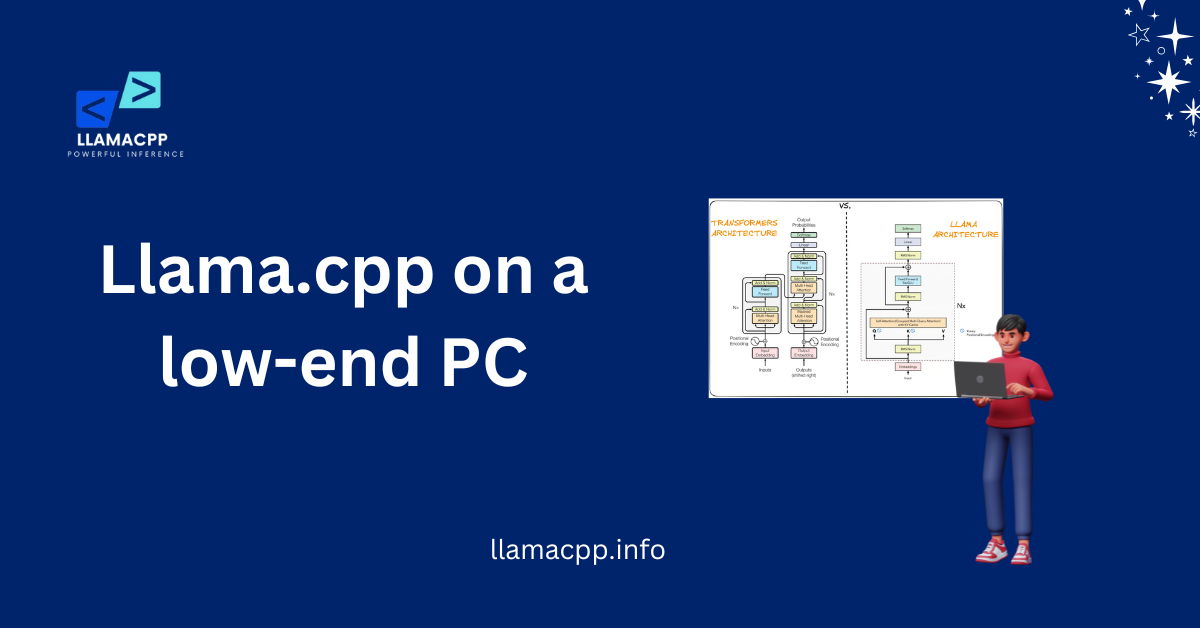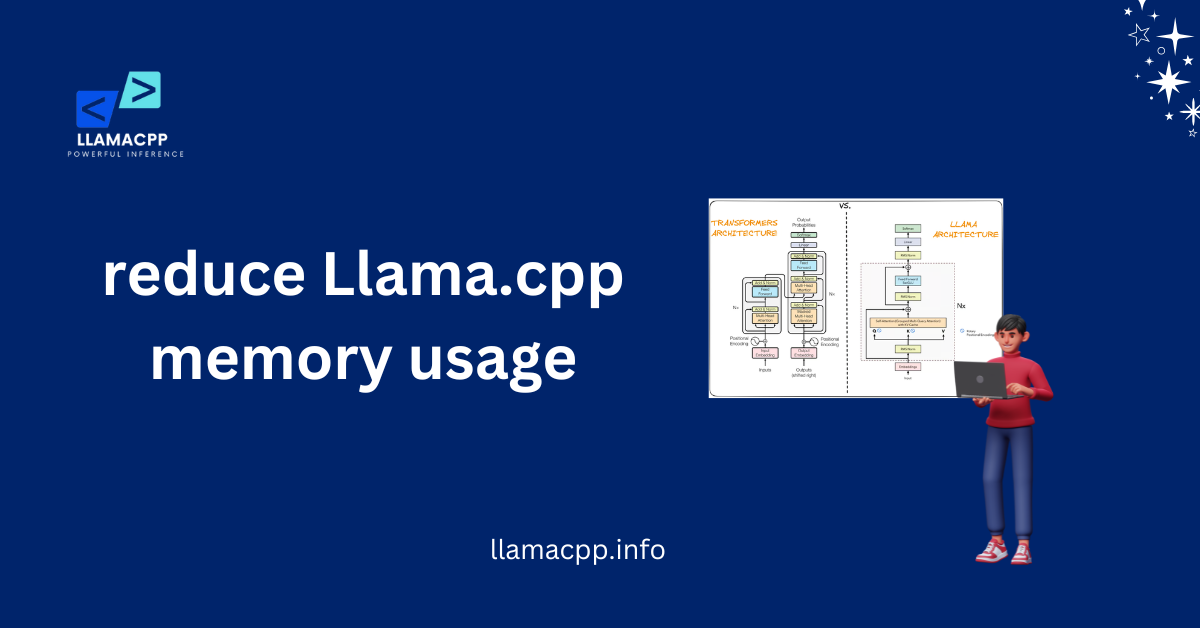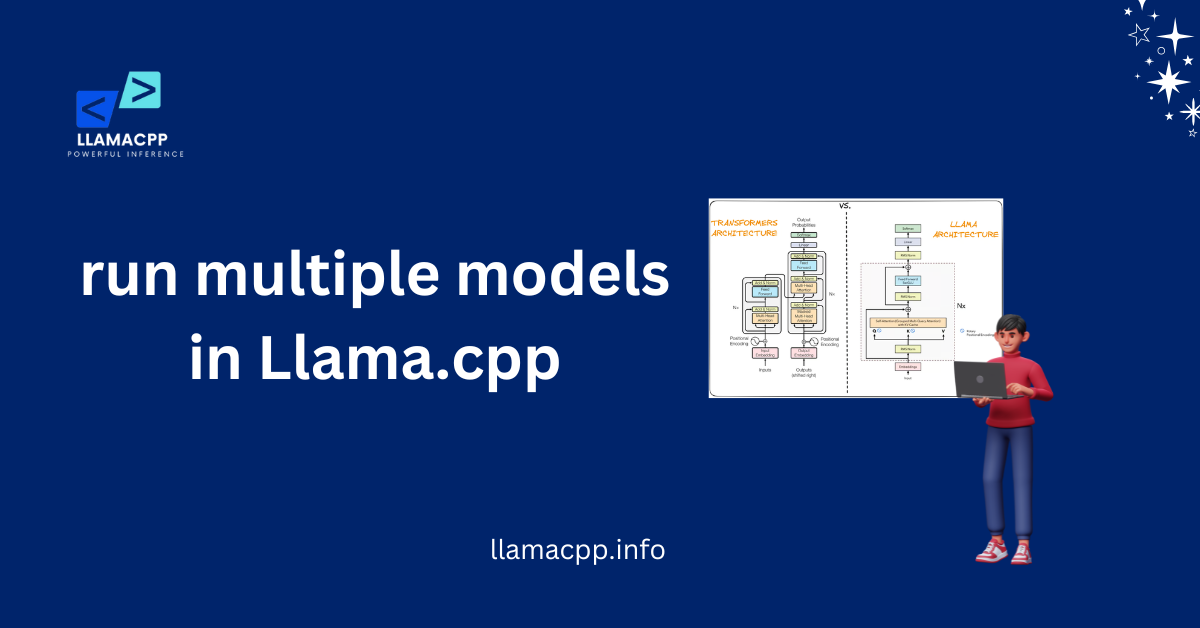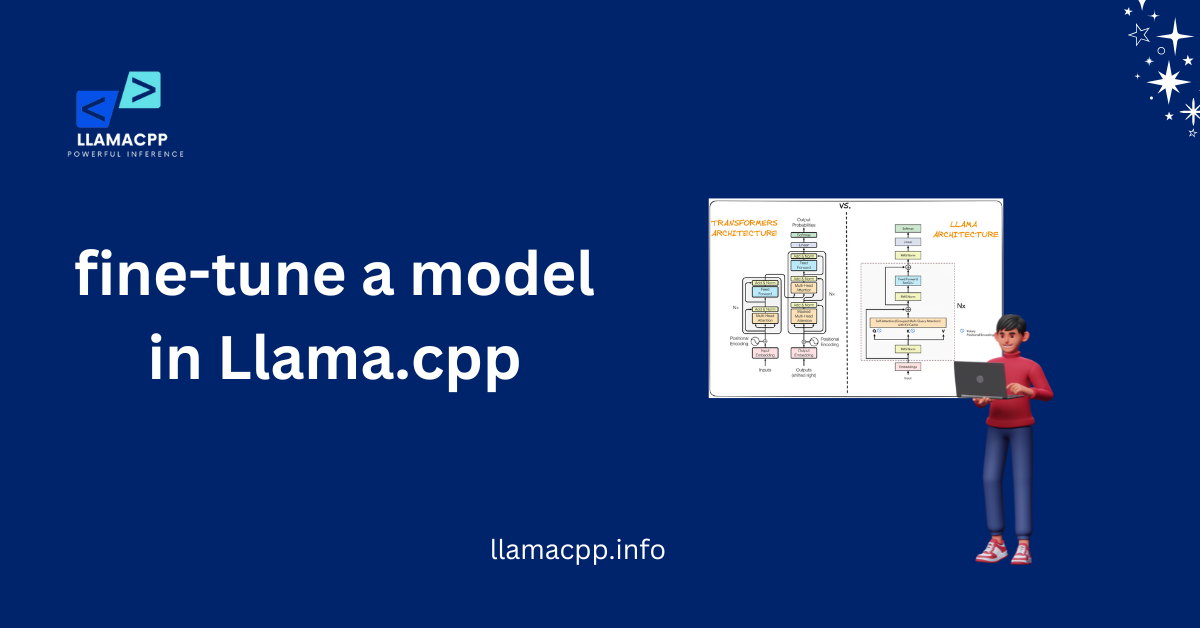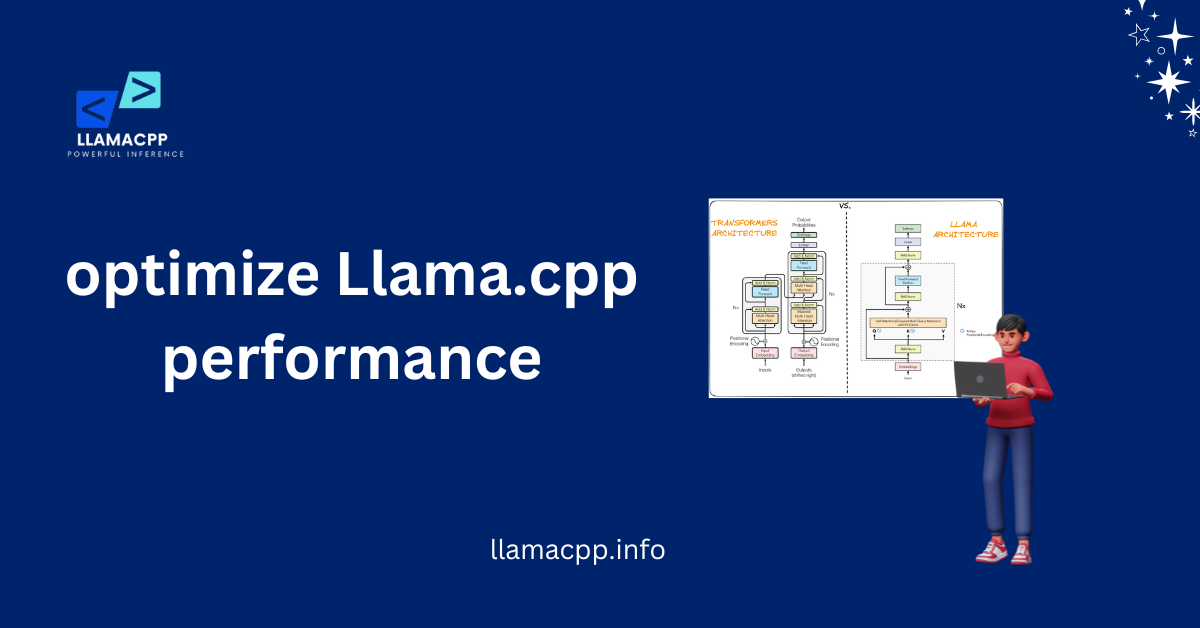Table of Contents
ToggleIntroduction
Llama.cpp on a low-end PC—can it really work? Many people think AI models need expensive hardware, but that’s not always true. Llama.cpp is designed to be lightweight, making it possible to run on regular computers. But a low-end PC can only do so much. Slow processing, low RAM, and weaker GPUs can make things tricky. But don’t worry—there are ways to make it work! With the correct settings and tweaks, you can still get decent performance.
The key is to manage resources wisely. Reducing model size, adjusting parameters, and using the correct version of Llama.cpp can help. You don’t need a supercomputer—just thoughtful adjustments. In this guide, we’ll study everything step by step. If you’re eager to use AI without changing your PC, you’re in the right place! Let’s dive in and see what’s possible.
What is Llama.cpp and How Does It Work?
Llama.cpp is a tool for running AI models directly on your computer. Unlike cloud-based AI, it handles everything locally, which makes it great for privacy and offline use. But what about running Llama.cpp on a low-end low-end PC? Yes, it is possible, but only if everything is set up correctly. Since low-end PCs have limited power, performance depends on how well you adjust settings and choose model sizes.
This framework is meant to be lightweight, meaning it doesn’t need a super-powerful G . Your CPU and RAM are more important than anything else. On a low-end PC, Llama.cpp can run smoothly if you change the settings, make the most of the memory, and choose a more miniature AI mod. We’ll examine its essential features and how they work in different situations.
1. Why Use Llama.cpp?
Llama.cpp is efficient and works without an internet li. This is great for people who want complete control over their AI mode. You can still do text-based tasks with Llama.cpp on a low-end PC that doesn’t have a lot of powerful hardware.
2. How Does It Process AI Models?
Llama.cpp breaks down complicated AI computations into smaller steps. Instead of relying on a powerful GPU, it uses optimized CPU-based calculations. This lets a low-end PC run Llama.cpp, even though it’s slower than a high-end PC.
3. Can It Run on Any PC?
Yes, but how well it works will depend on your computer’s speed. If your PC has low RAM or an older processor, you should use a more miniature mod. If you set up Llama.cpp correctly, it will work better and be more stable on a low-end PC.
Minimum System Requirements for Running Llama.cpp
It is possible to run Llama.cpp on a low-end PC, but your system needs to meet some basic needs. The most critical factors are CPU power, RAM size, and available storage. Since Llama.cpp is designed for efficiency, it doesn’t need a high-end G. However, speed will be different depending on what hardware you use. Some PCs might be able to run it, but speeds will be slower, and there may be some lag.
To get the best results, your PC should have at least a quad-core processor and 8GB of R . If you have less, you might face delays. Storage space also counts, especially for extensive AI modes. If you pick the right model size, Llama.cpp can run smoothly on a low-end PC without crashing.
1. How much RAM do you need?
For basic tasks, 8GB of RAM is the minimum. However, Llama.cpp on a low-end PC may work with 4GB if you use a smaller mod. More RAM helps speed up processing and reduce lag.
2. Does the speed of the CPU matter?
Y ! It is suggested that you have at least a quad-core process. If your CPU is slow, Llama.cpp on a low-end PC will take longer to process the responses. Faster processors improve AI performance.
3. Is a GPU Necessary?
No, but it held. A GPU isn’t needed because Llama.cpp dependencies mostly runs on C. Still, a simple GPU can speed things up, which means that Llama.cpp on a low-end PC will work better for bigger models.

Challenges of Running Llama.cpp on Low-End PC
Running Llama.cpp on a low-end PC is not always smooth. The biggest problem is weak hardware, e.g., a slow processor, low RAM, or small storage can make things difficult. AI models need the power to work correctly. If your PC is not strong enough, you may face slow responses, lag, or even crashes. Managing system resources well can help, but it takes some effort.
Another challenge is memory use. AI models use a lot of AM, so if your PC has only 4GB or less, it may struggle. Storage space is another issue. Some AI models are large and need more space. If your hard drive is almost complete, Llama.cpp on a low-end PC might not load at all. Let’s look at these problems in more detail.
1. Slow Processing Speed
A weak CPU takes longer to process AI ta ks. This means Llama.cpp on a low-end PC may take too much time to generate responses. Choosing a smaller AI model and lowering settings can help.
2. High RAM Usage
Low RAM can cause freezing or crashes. If Llama.cpp on a low-end PC runs out of memory, it might stop working. Closing background apps and using a swap file can help.
3. Storage Limitations
AI models need space to un. If your disk is almost complete, Llama.cpp working mechanism on a low-end PC may not work correctly. Deleting unnecessary files and using compressed models can solve this problem.
Optimizing Llama.cpp for Low-End PCs
Running Llama.cpp on a low-end PC can be challenging, but a few smart tweaks can improve performance. Since AI models need processing power, optimizing your system can help things run smoothly. Change settings, shrink models, and monitor system resources to avoid lag and crashes.
Another way to improve performance is to keep your PC can. Many apps and jobs running in the background slow things down. Clearing space and freeing up RAM makes a big difference. With proper optimization, Llama.cpp on low-end PCs can work efficiently. Let’s look at some helpful tips
1. Use a Smaller Model
AI models can be large and resource-heavy. Choosing a smaller version of Llama.cpp on a low-end PC reduces memory usage and improves use, helping to handle tasks without overloading the system
2. Make room for RAM
Low RAM slows down AI processes. Llama.cpp on a low-end PC can use more memory for smooth operation by closing unnecessary programs and turning off startup PS. Using a swap file can also help
3. Adjust Settings
Lowering batch size and enabling quantization can reduce CPU usage. These adjustments let Llama.cpp on a low-end PC run more efficiently without straining the hard drive. Small changes make a big difference!
Alternative Solutions If Your PC Struggles
If Llama.cpp on a low-end PC is too slow or keeps crashing, don’t worry! There are other ways to use AI without upgrading your hard drive. Cloud-based AI services and other lightweight options can be the solution. These options let you run AI smoothly, even on an older computer.
Another great option is using an external GPU or optimizing your system for her. Sometimes, even minor tweaks can make a significant difference. If your PC still struggles, check out these alternatives to keep Llama.cpp on a low-end PC running efficiently.
1. Use Cloud-Based AI Services
Cloud platforms let you use AI without counting on your PC’s power. Instead of running Llama.cpp on a low-end PC, you can access models online. This saves memory and speeds up processes.
2. Try a Lightweight AI Model
Some AI models require less work. On a low-end PC, using a smaller version of Llama.cpp can make it run faster. It may not be as powerful, but it works well for basic tasks.
3. Upgrade External Components
Use an external GPU or add more RAM. Even a minor upgrade can help Llama.cpp on a low-end PC run better. This is a good option if you don’t want to replace your computer.
Real-World Performance: What to Expect?
Running Llama.cpp on a low-end PC can be a mixed experience. It depends on your system’s capabilities. If your PC has limited RAM or an old processor, you may notice slower responses. AI models need resources to work properly. Without enough memory, tasks may take longer to complete.
However, with some tweaks, you can still get good results. Performance gets better if you shrink the model and close any apps running in the background. While Llama.cpp on low-end PCs won’t be as fast as on high-end systems, it can handle simple tasks well. Let’s explore what you can expect.
1. Slower Processing Speeds
A low-end PC takes longer to process AI-generated content. This happens because the CPU and RAM struggle to keep up. The response time increases, making things feel slow.
To enhance this, use a smaller model. This lessens the load on your system. Tweak settings such as batch size can also help with this. Minor adjustments like these contribute a lot to speed.
2. Random Lag or Freezing
If your PC has inadequate RAM, you will lag. When memory is depleted, Llama.cpp on a low-performing PC becomes slow. The system will even freeze for some time occasionally.
Closing unnecessary apps can fix this. Freeing up RAM will also make AI tasks run more smoothly. Running only essential programs helps avoid sudden crashes.
3. Performance Varies by Task
Basic text processing works fine. However, running complex models is difficult. Large AI tasks need more power, which a low-end PC may not have.
Stick to simple tasks for better results. Using optimized parameters also enhances efficiency. Llama.cpp on a low-end computer performs optimally when resources are efficiently managed.
Conclusion
It is possible to use Llama.cpp on a low-end PC, but it needs a bit of tweaking. Low-end PCs lack processing power, so AI models will slow down and struggle. However, tweaking settings, releasing resources, and using smaller models can improve efficiency.
If your PC still faces issues, cloud-based AI services or lightweight alternatives can be a good solution. While Llama.cpp on low-end PC won’t be as fast as on high-end systems, it can still handle basic tasks with the proper setup. With patience and tweaks, you can make the most of your hard work!
FAQs
1. Can I run Llama.cpp on a low-end PC?
Yes, you can run Llama.cpp on a low-end PC, but performance may be slow. Reducing model size and optimizing settings can help improve speed.
2. What are the minimum system requirements for Llama.cpp?
At least 4GB RAM, a decent CPU, and available storage are needed. More RAM and a better processor will improve performance.
3. How can I make Llama.cpp run faster on a low-end PC?
Close background apps, use a smaller AI model and adjust settings like the button size. These steps help reduce lag and improve efficiency.
4. Why does my PC freeze while running Llama.cpp?
Low RAM and CPU power can cause freezes. Freeing up memory and limiting resource-heavy tasks will help avoid system crashes.
5. Are there alternatives if my PC can’t run Llama.cpp ell?
Yes! Cloud-based AI models or lightweight AI tools are great alternatives. They require less processing power and work smoothly on low-end devices.

